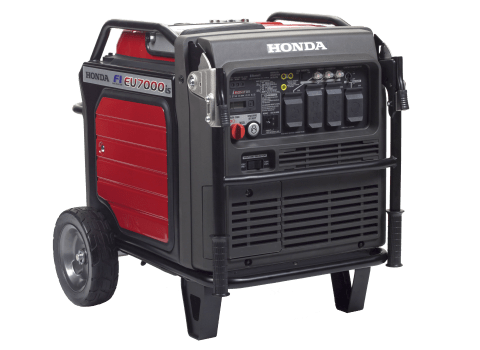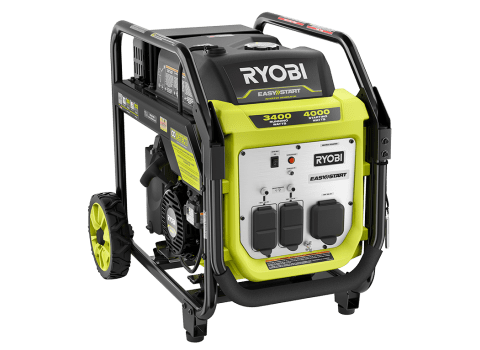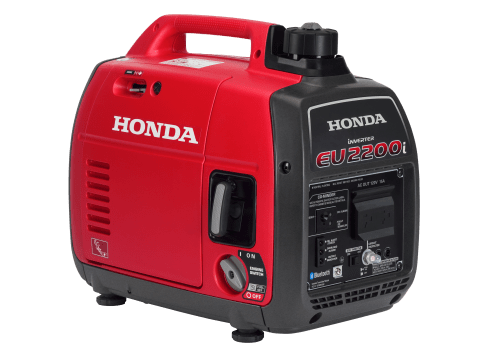Best and Worst Inverter Generators from Consumer Reports' Tests
These machines are pricier than more common, portable generators. But they run longer and quieter, and use less energy.

By Paul Hope, Tobie Stanger
Inverter generators are a relatively new, and improved, type of portable generator. You use both types of generator the same way, to power appliances and electronics after an outage at home or when you’re far from an electrical source. But as a group, inverter generators do better than regular portable generators in almost every way.
They run longer and use less energy. They also run more quietly, whether you’re using one at home or at a tailgate p arty. And they typically cost more, though the extra expense may be worth it.
"If money isn’t an issue, I would choose an inverter over a portable," says Misha Kollontai, the Consumer Reports engineer who tests generators.
But all inverter models are not created equal. Far from it. Consumer Reports tests have found big differences among inverter generators, especially when they’re pushed to extremes.
How an inverter generator works when demand for power is at its peak is important. A model that can’t keep up with power needs may shut itself down or cause appliances to overheat or stall out—something we routinely see in testing. If you have a generator that can’t keep up during peak demand, you’ll need to unplug some appliances in order to plug in others. You’ll also need to reset the generator’s circuit breaker each time you do.
How CR Tests Generators
To test generators for performance, our engineers load up each model with key appliances you might want to power during an outage, such as a space heater, refrigerator, and window air conditioner. We make sure the generator can handle the load it’s supposed to, and also look at what happens when a sudden electrical spike hits, for example, if your refrigerator compressor kicks on when the generator is already close to its limit. The best models take that in stride while others bog down or even stall. We also look at how easy it is to move and use a generator, as well as how efficiently it uses gasoline and how long it runs on a single tank.
We also developed a CO safety technology test to evaluate new automatic shutoff features on portable and inverter generators and low-CO engines.
Our ratings of dozens of models include the brands you’ll see whether you’re shopping online, or buying at home centers or dealers: Briggs & Stratton, Generac, Honda, Predator and Ryobi. In addition to inverters, you’ll also find traditional gasoline-powered portable generators and home standby generators. Prices for generators in our ratings range from about $450 for a modest generator that can power a few key appliances, to more than $4,000 for home standby models that can handle everything in your house.
Start with our generator buying guide for advice on which kind of generator you’ll need. CR members can read on for ratings and reviews of top-rated or CR Best Buy inverter generators, one from each of the four size categories. We also call out two large inverter models to skip.
As always—and regardless of whether or not you buy a generator with a CO safety shutoff—use a gasoline generator only outdoors, at least 20 feet from your house, with the exhaust directed away from any windows or doors.
Best Inverter Generators in CR's Tests
Each of these top-rated or CR Best Buy inverter generators has CO safety technology designed to stop the engine if carbon monoxide reaches certain limits in an enclosed space, a feature CR considers very important. Each scored Very Good or Excellent in tests of that function.
Large Inverter Generator
Produces 5,000 watts or more (220-volt-capable)
Honda EU7000is with CO-MINDER

CR’s take: This Honda is the best large inverter generator in our ratings. It’s quiet, efficient, and exceptionally reliable in its ability to meet fluctuating demands for power—it earns a rating of Excellent for power quality. It uses 8 to 16 gallons of gas a day to power a typical household, about half the amount of fuel that some similarly sized traditional generators use to deliver the same amount of power. Plus, it has a CO safety shutoff.
Midsized Inverter Generator
Produces 2,500 to 5,000 watts
Ryobi RYi4022X

CR’s take: The moderate-sized Ryobi RYi4022X is a stellar performer, and a CR Best Buy. That’s because it’s less pricey than other, top-rated inverter generators in our ratings, including the Honda EU3000iS with CO-MINDER, Echo EGI-4000, and Briggs & Stratton 30795. Though this unit weighs just 85 lbs., it offers an impressive, 3,400-watt output, and—conveniently—four power outlets. Its CO safety technology is rated Excellent. But it’s short on other features, such as electric start, fuel gauges, and a low-oil shut-off indicator light.
Small Inverter Generator
Produces 1,500 to 2,500 watts
Honda EU2200iTAG

CR’s take: This small portable generator from Honda is the best in its class. It’s reliable and produces high-quality power without distortion, earning a rating of Excellent for power quality. That’s important in order to avoid frying sensitive electronics, such as a charging smartphone. It’s quiet and produces 1,800 watts. It has a CO safety shutoff, plus it’s designed to produce lower CO emissions.
Mini Inverter Generator
Produces less than 1,500 watts
Predator 57063

CR’s take: In CR’s ratings, the 38-lb. Predator 57063 is the only one in its category—so it’s not technically "best." But it merits mention because it’s a capable and fairly quiet workhorse, producing up to 1,100 watts. In CR’s tests it handled surges well, and its power quality was Excellent. It delivered enough power to run our test appliances. You could use it while boating to recharge some of your electronics—or while camping to power a TV, small fridge, a fan, some cell phone chargers, and a slow cooker. (It doesn’t have enough wattage to power other cooking appliances.) For a portable, it’s also relatively easy to start, and has some helpful features for starting and operating. Plus, it has a CO safety shutoff.
Worst Inverter Generators in CR's Tests
These 5,000-watt units, though less costly than other large inverter generators, failed to reliably produce the amount of power promised by their manufacturer. You’ll have to spend several hundred dollars more to get a highly rated, large inverter model that reliably produces the claimed wattage.
Briggs & Stratton Q6500

CR’s take: The Briggs & Stratton Q6500 lacks CO safety technology, designed to stop the engine if carbon monoxide reaches certain limits in an enclosed space. That alone is a major knock against it. But it also fails in its most key function. In our tests for power quality and delivery, we found that it can handle only modest, constant loads, and fails, when pressed, to handle a surge in power demand. That earned it a rating of Poor for power delivery. It’s safe to say this is one to avoid. To get a highly rated, large inverter model that reliably produces its claimed wattage, consider paying more for the Predator 9500 with CO SECURE Generator, a competitively priced large unit that is rated Very Good overall.
Briggs & Stratton 030761

CR’s take: Like the Briggs & Stratton Q6500, the Briggs & Stratton 030761 large inverter generator earns a Poor score for power delivery. It’s otherwise nearly identical in its performance and features to that lower-rated brand-mate. The one major difference: This model has CO safety technology. We found that feature performed acceptably, but may in certain cases allow the release of more carbon monoxide than other models we tested before shutting down. To get a highly rated, large inverter model that reliably produces its claimed wattage, consider paying more for the Predator 9500 with CO SECURE Generator, a competitively priced large unit that is rated Very Good overall.
Generator Tips
Damaging storms can happen anytime. On the "Consumer 101" TV show, host Jack Rico learns from Consumer Reports expert Paul Hope how to avoid being left in the dark during a power outage.
More from Consumer Reports:
Top pick tires for 2016
Best used cars for $25,000 and less
7 best mattresses for couples
Consumer Reports is an independent, nonprofit organization that works side by side with consumers to create a fairer, safer, and healthier world. CR does not endorse products or services, and does not accept advertising. Copyright © 2022, Consumer Reports, Inc.

